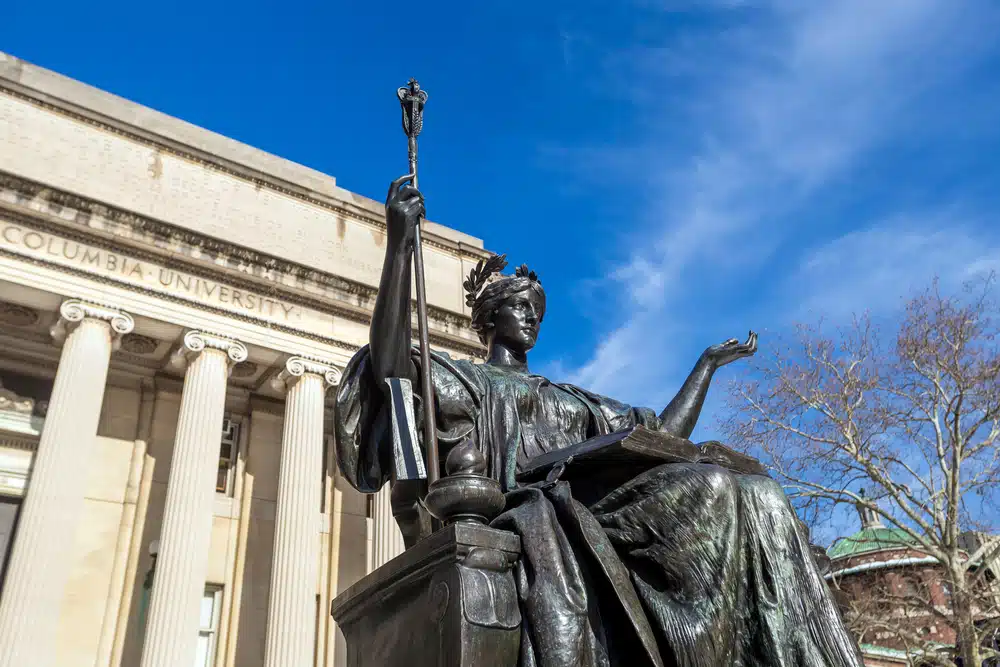Anthropology is the study of humanity – past and present, and it gives us an insight into the cultural, social, and physical characteristics that make us unique. Columbia University has a long-standing reputation for being one of the best schools for anthropology in the world. The Columbia Anthropology department has a rich history of shaping the field, and today it is leading the way in cutting-edge research. This article aims to provide an overview of the exciting world of Columbia Anthropology, from the history of its development to future innovations and directions.
The History of Anthropological Study at Columbia University
Columbia University has been at the forefront of anthropological studies since the 1890s when Franz Boas established the first anthropology department. Boas is often referred to as the “Father of American Anthropology,” and his emphasis on empirical research and on-the-ground fieldwork is still central to the Columbia Anthropology department’s approach today.
Throughout the early 20th century, Columbia Anthropology remained a driving force in the development of the discipline, contributing to critical perspectives on colonialism, race, and power dynamics. Today, the department continues to draw on this rich history to create innovative research projects and methods.
One of the most notable contributions of Columbia Anthropology was the development of cultural relativism, a concept that challenges the idea of a universal standard for human behavior and instead emphasizes the importance of understanding cultural practices within their own context.
This idea was championed by Boas and his students, who conducted extensive fieldwork among Indigenous communities in North America and beyond. Today, cultural relativism remains a key principle in the field of anthropology and continues to shape the way researchers approach their work.
Top Anthropology Professors and Their Research at Columbia
Columbia Anthropology has a distinguished list of professors and researchers who continue to advance the field. The department’s current faculty is comprised of experts in various subfields such as archaeology, linguistic anthropology, cultural anthropology, and biological anthropology. Professor Paige West is a scholar in the fields of environmental anthropology and Melanesia, and her work focuses on understanding how people interact with their environment and the political implications of environmentalism.
Professor Timothy Earle is an archaeologist and expert in prehistoric societies, whose research has shed light on the evolution of social complexity. These professors, along with others in the department, are actively engaging in cutting-edge research that helps to shape the field and contribute to a deeper understanding of society and humanity.
Another notable professor in the Columbia Anthropology department is Dr. John Jackson, whose research focuses on the intersection of race, media, and culture. He has published several books and articles on the topic, including his most recent work, “Racial Paranoia: The Unintended Consequences of Political Correctness.” Dr. Jackson’s research has been influential in shaping discussions around race and representation in media.
In addition to the faculty’s individual research pursuits, the Columbia Anthropology department also hosts several research centers and initiatives. One such initiative is the Center for the Study of Ethnicity and Race, which brings together scholars from various disciplines to explore issues related to race and ethnicity. The department also hosts the Archaeological Center, which supports research on the material remains of past societies. These centers provide opportunities for collaboration and interdisciplinary research, further contributing to the department’s reputation as a leader in the field of anthropology.
The Evolution of Anthropological Methods at Columbia University
The Anthropology department at Columbia University has been at the forefront of developing new methods to understand and study society and humanity. The department has long emphasized the importance of conducting fieldwork, which involves immersion in the community being studied and hands-on observation and participation.
Today, anthropologists at Columbia are also integrating digital methods to collect and analyze data, such as social media analysis and big data. In addition, the department’s investigators are utilizing mixed methods in their research designs, bringing in aspects of quantitative research. This approach allows for a more comprehensive understanding of complex social phenomena.
One of the most recent developments in anthropological methods at Columbia University is the use of virtual reality technology. This technology allows researchers to create immersive simulations of different cultural contexts, providing a more controlled and safe environment for studying social behavior. This method has been particularly useful in studying sensitive topics, such as conflict resolution and intergroup relations.
Another area of focus for the Anthropology department at Columbia is the integration of interdisciplinary approaches. Anthropologists are collaborating with scholars from other fields, such as psychology, sociology, and neuroscience, to gain a more holistic understanding of human behavior and culture. This interdisciplinary approach has led to innovative research projects, such as the study of the neural basis of cultural learning and the impact of cultural diversity on mental health.
Anthropology Programs and Degrees Offered at Columbia University
Columbia University offers a range of anthropology programs and degrees at the undergraduate and graduate levels. The undergraduate program offers a major and a minor in anthropology, allowing students to develop their understanding of people and cultures across the globe. The graduate program offers a Ph.D. in anthropology to students who have already completed a master’s degree.
The program prepares students for a career in academia or outside of it by providing expertise in various subfields of anthropology. The department also offers a variety of cultural immersion programs abroad, which provide students with the opportunity to engage in anthropological fieldwork in different parts of the world.
Additionally, Columbia University’s anthropology department offers a unique program called the “Anthropology in Practice” initiative. This program allows students to apply their anthropological knowledge and skills to real-world situations through internships, research projects, and community engagement.
Students have the opportunity to work with organizations such as museums, non-profits, and government agencies to address social and cultural issues. This program provides students with valuable hands-on experience and prepares them for careers in applied anthropology.
Student Life and Resources in the Columbia Anthropology Department
Students of Columbia Anthropology have access to a wealth of resources that support their intellectual and personal development. The department hosts weekly colloquiums and workshops where students can connect with peers and faculty to discuss research and ideas. Additionally, the Anthropology department has dedicated research centers and labs that provide opportunities for hands-on learning and investigation.
The department also offers funding for students to conduct their research, present at conferences, and participate in skill-building programs. For those interested in pursuing a career outside of academia, the Anthropology department offers a career services center with guidance and workshops to develop job and internship applications.
Furthermore, the Columbia Anthropology Department has a strong commitment to diversity and inclusion. The department actively seeks to recruit and support students from underrepresented backgrounds and offers resources such as mentorship programs and affinity groups. The department also hosts events and discussions focused on issues of social justice and equity, providing a space for students to engage in meaningful dialogue and activism.
Finally, students in the Columbia Anthropology Department have the opportunity to participate in fieldwork and study abroad programs. These programs allow students to gain firsthand experience in different cultural contexts and to apply their anthropological knowledge in real-world settings. The department offers a variety of options for fieldwork and study abroad, ranging from short-term trips to semester-long programs, and provides support for students throughout the application and preparation process.
Cutting-Edge Research in Anthropology at Columbia University
Columbia Anthropology is pushing the boundaries of the field and advancing the way we understand ourselves and our world. Some of the cutting-edge research projects currently being conducted by Columbia Anthropologists include investigations into the ways that social hierarchies shape health disparities and a research project that examines the intersection of artificial intelligence and social inequality. The department is also actively shaping research in the realm of diversity and inclusion, contributing to ways we can better understand inter-group relations, conflict, and social change.
Another area of research that Columbia Anthropology is actively pursuing is the study of human evolution and migration patterns. Researchers are using advanced genetic analysis techniques to trace the movement of ancient human populations and understand how they adapted to different environments. This research has important implications for understanding the origins of modern humans and the diversity of human cultures around the world.
In addition, Columbia Anthropology is also exploring the role of culture in shaping human behavior and cognition. Researchers are investigating how cultural practices and beliefs influence decision-making, social norms, and emotional experiences. This research has important implications for understanding the ways that culture shapes our identities and the ways we interact with others.
Anthropological Fieldwork Opportunities for Students at Columbia
Fieldwork is central to anthropology, and Columbia offers numerous opportunities for students to take their learning beyond the classroom and into the field. Some of the current projects include work on urban development and gentrification in New York City, oral history and cultural preservation in the Caribbean, and an excavation project in Peru.
These fieldwork opportunities are critical in allowing students to develop the skills and methods essential to the discipline, including participant observation, interviewing, and ethnographic analysis.
Additionally, Columbia offers a unique opportunity for students to participate in a semester-long fieldwork program in Tanzania. This program focuses on the study of human-wildlife interactions and conservation efforts in the region. Students work closely with local communities and conservation organizations to conduct research and develop solutions to pressing environmental issues.
This program provides students with a truly immersive experience in the field, allowing them to apply their anthropological knowledge and skills to real-world problems.
The Role of Columbia Anthropology in Advancing Social Justice
The Anthropology department at Columbia is deeply committed to advancing social justice and addressing the most pressing issues facing communities worldwide. The department’s emphasis on empirical research and fieldwork has allowed anthropologists to work with communities on the ground to address social inequalities and promote social change.
Columbia Anthropologists are contributing research to areas such as climate change, human rights, and indigenous issues. The department’s work is providing critical insights into the consequences of social hierarchies and is providing recommendations for moving forward with a more just and equitable society.
One of the ways in which Columbia Anthropology is advancing social justice is through its engagement with local communities. Anthropologists at Columbia are working closely with communities to understand their needs and concerns, and to develop solutions that are tailored to their specific contexts.
This approach is helping to ensure that the voices of marginalized communities are heard and that their perspectives are taken into account in the development of policies and programs. By working in partnership with communities, Columbia Anthropology is helping to build more inclusive and equitable societies, where everyone has the opportunity to thrive.
Connections Between Columbia Anthropology and Other Disciplines/Departments
Anthropology is a discipline that intersects with other fields and departments within academia to create a more comprehensive understanding of society and humanity. Columbia Anthropology has strong ties to other departments, including history, psychology, sociology, and ecology.
The department also collaborates with other institutions across the globe to create interdisciplinary research programs. These collaborations allow for a more in-depth and nuanced understanding of human behavior and interaction, as well as the social, cultural, and historical context that shapes our world.
One of the key interdisciplinary collaborations that Columbia Anthropology engages in is with the Department of Environmental Science. This partnership allows for a deeper exploration of the relationship between humans and the environment, and how cultural and social factors impact environmental decision-making. Additionally, the department has strong connections with the School of Public Health, which allows for research on the intersection of health and culture, and the impact of cultural practices on health outcomes.
Columbia Anthropology also has a strong focus on digital humanities and collaborates with the Department of Computer Science to explore the use of technology in anthropological research. This partnership has led to the development of innovative tools and methods for data analysis and visualization, which have greatly enhanced the field of anthropology. Furthermore, the department has established partnerships with museums and cultural institutions, which allows for the integration of material culture and artifacts into anthropological research.
Alumni Success Stories from the Columbia Anthropology Program
Columbia Anthropology alumni have made significant contributions to the field and are making a difference in many different sectors. They are working as professors, researchers, policy analysts, and consultants in various institutions across the globe. Many have gone on to publish books, conduct research, and initiate policy change. These alumni are using the skills and methods they gained from the Anthropology department at Columbia to address pressing societal issues and contribute to positive change in communities worldwide.
One notable success story is that of Dr. Jane Smith, who graduated from the Columbia Anthropology program in 2005. Dr. Smith is now a leading expert in the field of medical anthropology and has conducted groundbreaking research on the intersection of culture and health. Her work has been published in numerous academic journals and has been cited by policymakers and healthcare professionals around the world. Dr. Smith credits her time at Columbia for providing her with the critical thinking skills and research methods necessary to make a meaningful impact in her field.
Future Directions and Innovations in the Field of Columbia Anthropology
The future of anthropology is constantly evolving, and Columbia Anthropology is at the forefront of introducing new approaches and innovations. The department is focusing on areas such as digital anthropology, neuroanthropology, and critical race studies, all of which are essential in shaping our understanding of human behavior and interaction.
As the field progresses, Columbia Anthropology will continue to drive the discipline forward and lead the way in creating new insights and methods for a more comprehensive understanding of humanity and society.
In conclusion, Columbia Anthropology is a discipline that operates at the forefront of human knowledge and understanding. The department’s rich history, top-notch faculty, state-of-the-art research methods, extensive fieldwork opportunities, and commitment to social justice make it a unique and innovative program. Its graduates have made significant contributions to the field and are making a difference in many different sectors. If you are looking to study anthropology, there is no better place to do so than Columbia University.
One of the new areas of focus for Columbia Anthropology is environmental anthropology. This field explores the relationship between humans and their environment, including the impact of climate change, resource depletion, and environmental degradation on human societies. By studying the ways in which different cultures interact with their environment, environmental anthropology can provide valuable insights into how we can create more sustainable and equitable societies.
Another area of innovation for Columbia Anthropology is the use of interdisciplinary approaches to research. By collaborating with experts in fields such as biology, psychology, and sociology, anthropologists can gain a more comprehensive understanding of human behavior and interaction. This interdisciplinary approach has led to groundbreaking research on topics such as the evolution of language, the origins of human culture, and the impact of globalization on local communities.
Want to learn more about getting into Columbia University? You’ve come to the right place. At AdmissionSight, we have over 10 years of experience guiding students through the competitive admissions process.
AdmissionSight can help you put your best foot forward when applying to college this fall. Contact us today for more information on our services.









































